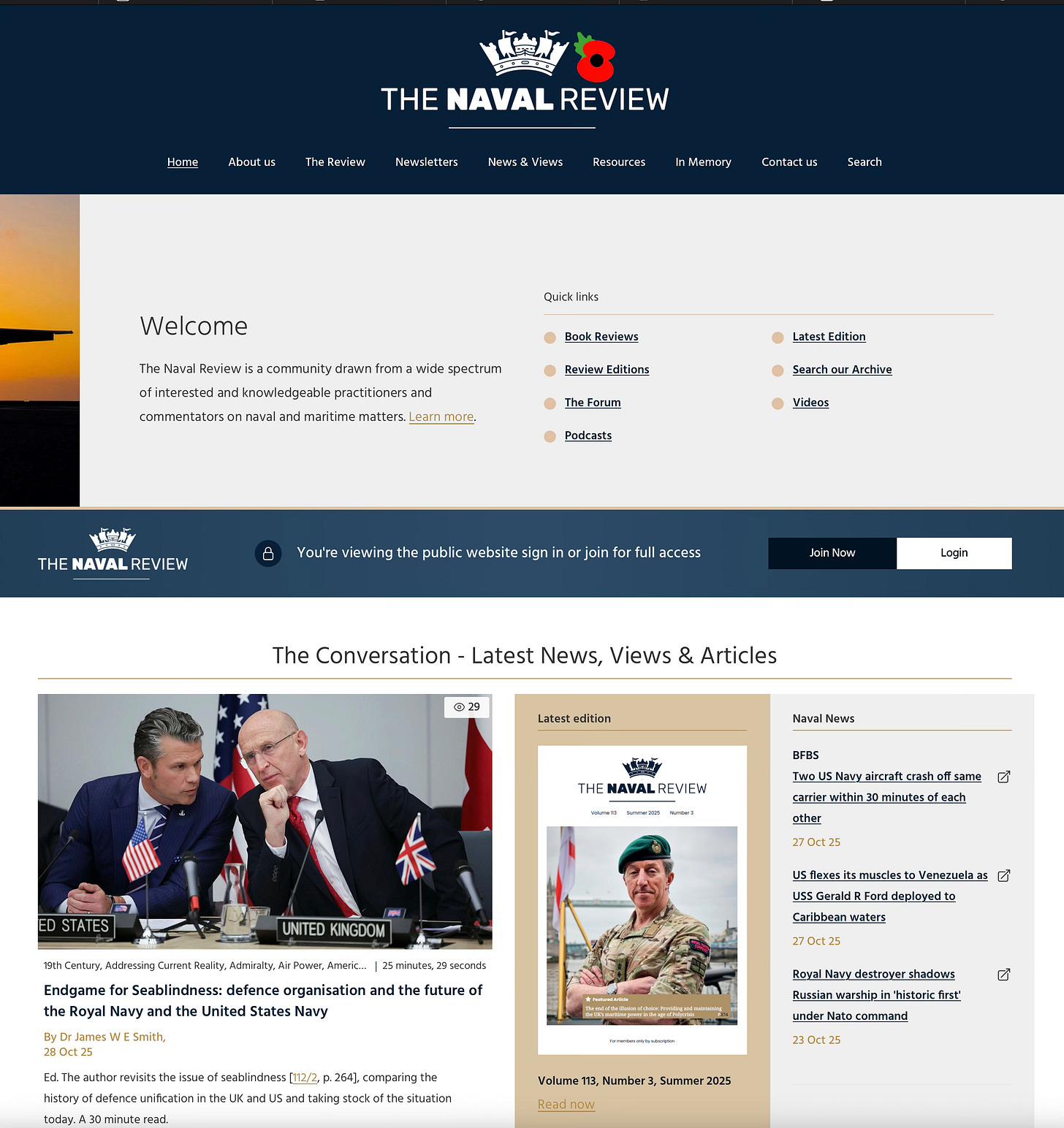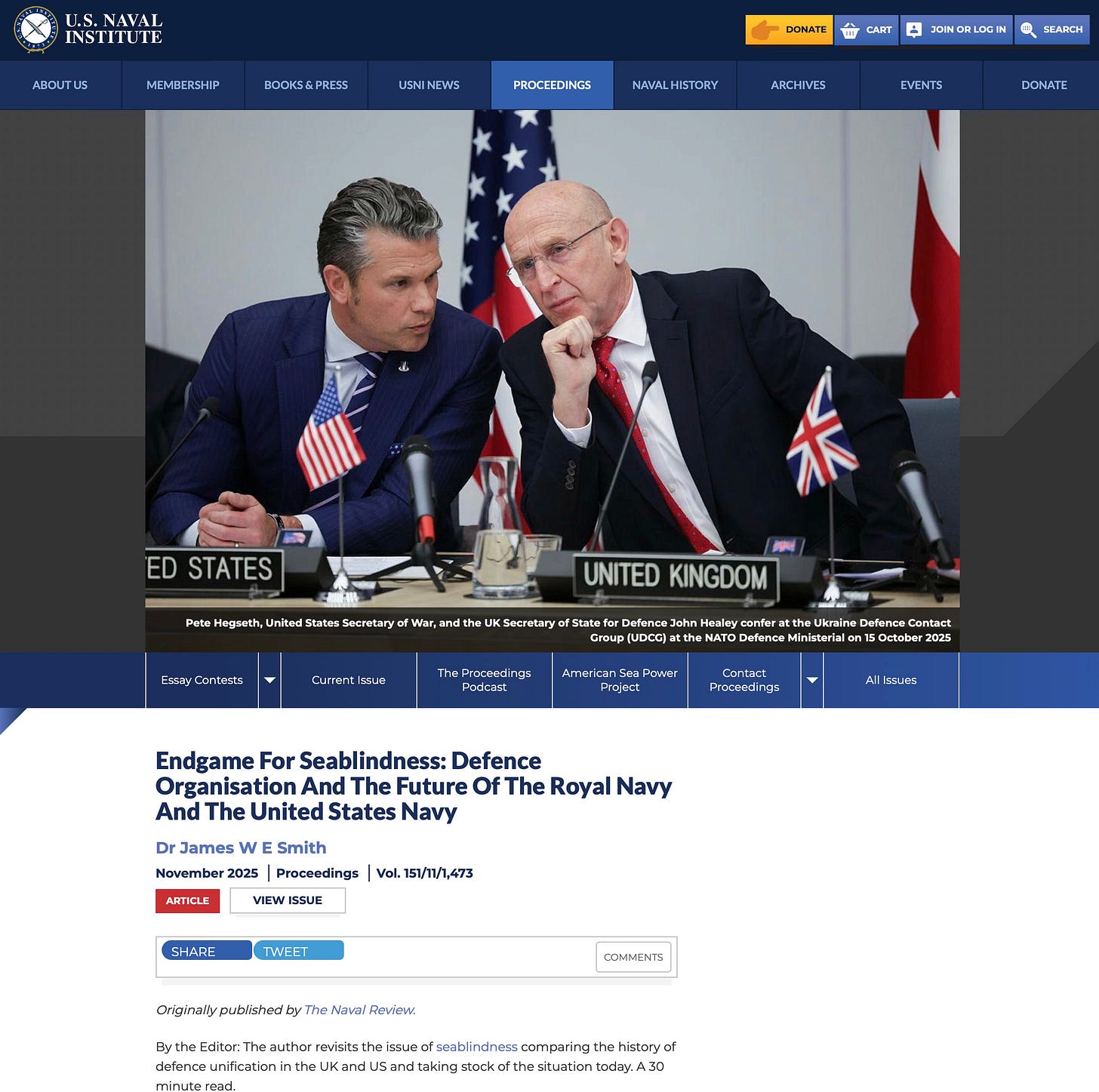Endgame for Seablindness: defence organisation and the future of the Royal Navy and the United States Navy
Navies must reinvent themselves and retake the lead on defence organisation. Their futures, that of national defence strategy and warfare may very well depend on it.
If you are member of the UK Naval Review, or US Naval Institute, including associated partners around the world, you can now read my latest paper titled:
‘Endgame for Seablindness: defence organisation and the future of the Royal Navy and the United States Navy.’
I argue, the future of navies, let alone strategy, and warfare may very well depend on the future steps taken with the next iteration of defence organisation––for one is now long overdue––whatever form that needs to be, it must be of one united from seabed to space.
Opening Paragraph:
It is an overlooked fundamental fact that the analysis of history proves, since the founding of a professional navies, which started with the Royal Navy in 1546, that if you cannot communicate what this military power is for, or what both ‘maritime’ and ‘sea’ mean to a nation, then nothing else matters. Most issues, debates, discord, discussions, and disagreements flow from the failure to consider this the number one priority. This uncomfortable fact has been forgotten, because too often naval minds are tourists in nostalgia––something antithetical to the fact that the very best maritime thinkers and naval personnel were rebellious to status quos, and adverse to the comfort of armchairs of the wardroom––and yet this is understandable to some degree. This is because few have accepted that the centrality of American naval power and British seapower to their respective nations ended after 1945. Although there are many factors at play, critically, the organisational setup of unified defence broke down the systems for communicating about the navy and seas influence on nation. Past systems to communicate were taken for granted, today misunderstood, let alone never rejuvenated. This is partially the root of why many in leadership roles have struggled to communicate about the navy in an effort to encourage those with the authority to take that message and act upon it, particularly after the 1980s defence reforms and the end of the first Cold War.
...Let’s not mince words, it’s simply not true that the DoD going back to DoW is historically accurate. The Pentagon as a physical establishment going back to the War Department bares some truth but in reality, to ignore pre-defense unification, with separate equal Departments of War and Navy, not just a War Department, is a travesty. If any historian, in the employ of the American people, let alone more broadly, has spread a mistruth they should be taken to account and questioned if they have misled elected officials. We should be talking about the next version of the DoD, but equally, asking questions of where naval and maritime voices are to protect the hard work navies put in to shape defence orginisation and the US navy prior to defence unification: aka the Navy Department. Yet again, seablindness and the complete ineptitude of those in and out of uniform to be able to communicate ‘navy’ has never been so rawly exposed...”
Preview of content:
But seablindness is not a mere matter of ‘literacy’; behind seablindness is something more important: our understanding of our world and the space around it, and ultimately how our civilization works. The majority of humans do not think in these terms and are far less sensitive to the fragility of the nation, life, and dependency on logistics on Planet Ocean [Earth] than previous generations. This reminds us that rampant navalism won’t singularly solve the issue, as the public’s views on what the navy is and what it is for vary more widely than those of any other military service. Arguably, you can’t ever beat the scale of the seablindness problem, just contain it the best you can. A helpful analogy is that astronauts will never be able to truly explain their experience in space because the majority of the human populace has no way of connecting with what they are talking about.
To reverse course from seablindness completing its journey, a journey complete when enough factors have aligned as they now appear to be, will rest on two future actions…


